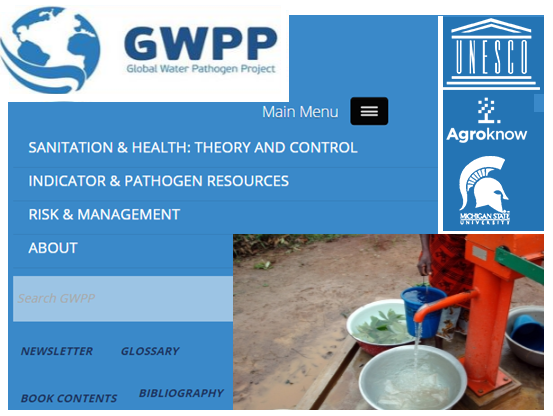Global Water Pathogen Project: restoring and protecting water safety


The Global Water Pathogen Project mission is to be a knowledge resource and hub on water pathogens to guide the goals for sanitation and achieving safe water around the world using the power of new information technology and tools.
“Nearly 97% of the world’s water is salty or otherwise undrinkable. Another 2% is locked in ice caps and glaciers. That leaves just 1% for all of humanity’s needs — all its agricultural, residential, manufacturing, community, and personal needs” (U.S. Environmental Protection Agency).
“Pipes are old and treatment facilities often outdated. We must make heavy investments in and commitments to increased water testing and state-of-the art infrastructure” (Time Magazine, 2016).
“There are many treatment options to eliminate pathogenic microbes from drinking water. Finding the right solution for a particular supply requires sifting through a range of sometimes competing processes” (Water treatment and pathogen control. World Health Organization).
A one-day workshop held 4th of May 2014 laid the ground work for building a knowledge community to develop The Global Water Pathogen Hub, an online resource which would include the updated version of the Sanitation and Disease: Health Aspects of Excreta and Wastewater Management book (Feachem et al.1983).
The Global Water Pathogen Project (GWPP) is an online open access integration platform for sharing and retrieving databases, quantitative information, tools, and educational materials on pathogens (associated with excreta and wastewater) which can guide future goals for achieving safe waters.
The project aims to develop a knowledge supply chain for safe water using advanced information technology providing high applied quality data, translating the scientific knowledge into socio-technical recommendations for safe water supply and sanitation.
To that end the GWPP gathers, organizes and provides information on global pathogen occurrence and persistence in water and evaluation of disinfection and treatment technologies.
Users of the GWPP site can browse through the following published Chapters:

(Source: Water Pathogens.org )
NOTE: the GWPP site is under construction and will be gradually populated with contents. Currently only titles in bold indicate contents that have been published.
Another key objective of the project is to promote collaboration among academics, industries and governments (see: The GWP Network).
To achieve its goals, the project counts on the active participation of the following organizations:
- UNESCO - a principal partner in the Project, steering the revision and dissemination of Health Aspects of Excreta and Sanitation, and reaching a number of governments to sensitize and mobilize them to address water quality issues (see: UNESCO’s goals ‘Water Security’), in collaboration with:
- Michigan State University (MSU) Midland Research Institute for Value Chain Creation;
- AgroKnow that in collaboration with MSU is building the GWPP site,
with financial support provided from P&G and the American Chemistry Council. The GWPP Project is also collaborating with the World Health Organization (WHO) of the United Nations to support its Sanitation Guidelines.
The knowledge accumulated and data generated by the GWPP is freely available as an online reference and will be updated regularly by experts.

Retrievable resources focus on pathogens and pathogen risks from excreta, address sanitation technologies, and serve as a compendium of information and quantitative data to support risk assessment, to achieve pathogen removal and global water safety criteria.
Users can now register and log into the GWPP site, to submit their content:

The information itself is forward-looking and should address future needs, problems, and solutions across the globe and complement the Sustainable Development Goals (Goal 6: Ensure access to water and sanitation for all) and similar initiatives.
In addition to a diversity of disciplinary backgrounds, the final product will be accessible across languages, geographic regions, and interests.
____________________________________________________________________________________________________
“Just imagine our nation and our world without water pollution. It is only by working together that we can make this happen for future generations” (Time Magazine, 2016).
Source: Global Water Pathogens Project
Save the date:
- July 18-22, 2016
6th Africa Water Week Achieving the SDGs on Water Security and Sanitation
Dar es Salaam, Tanzania
- October 9 – 14, 2016
International Water World Water Congress & Exhibition,
Brisbane, Australia

